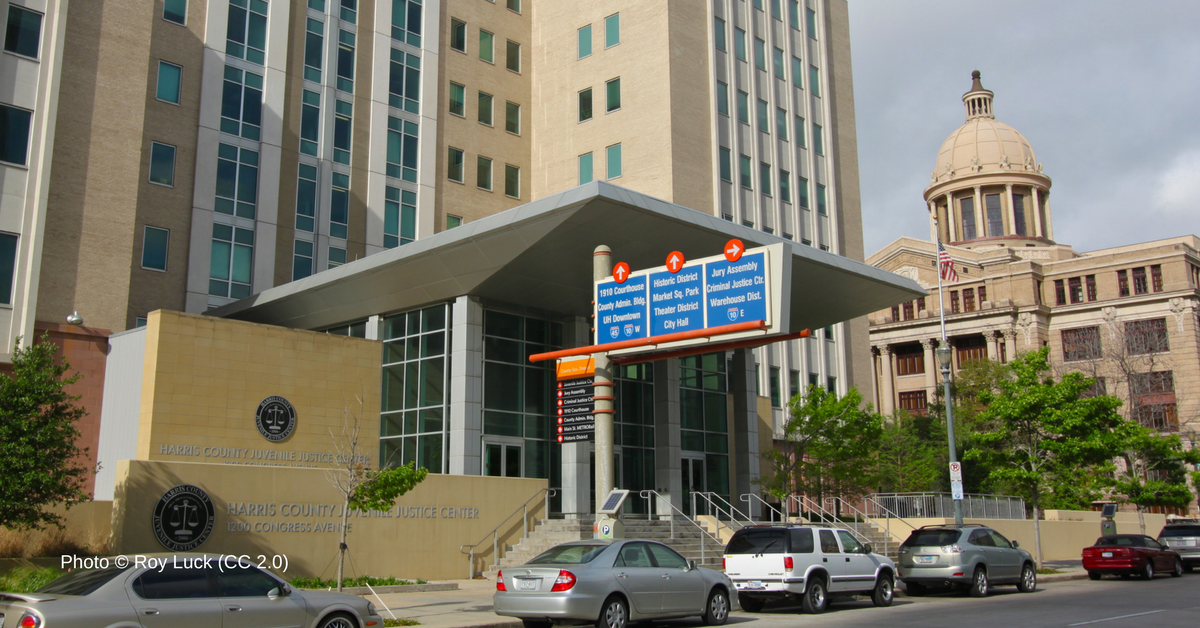I wanted to make sure you saw the investigative report that the Texas Tribune published today on the high number of youth locked up in Harris County Juvenile Probation for minor offenses. The article makes clear this is taking a disturbing toll on Harris County children.
I encourage you to read the whole article, but here are a few key excerpts followed by some of my reactions about the policy implications:
The Harris County Juvenile Justice Center. Photo © Roy Luck (CC 2.0)
“Just like the rest of the state, Harris County has seen fewer juveniles enter the criminal justice system over the past decade. Yet the population of the 210-cell juvenile detention center, which mostly holds kids between 10 and 16 years old who have not yet been convicted of a crime, has spiked in recent years.
“Last year, an average of close to 300 kids stayed there each day, up from just over 160 a few years back.”
“That’s put an enormous strain on the staff there, officials say. Fights break out more often, and kids get a lot less individual attention during school hours.”
“The data from Harris County’s juvenile probation department shows:
- The average number of kids held in the detention center charged with minor offenses such as trespass, theft and violating probation — things that some experts say shouldn’t land kids behind bars at all — increased by 64 percent from 2010 to 2017. Meanwhile, the average number held for violent crimes like armed robbery and rape, called “felonies against persons,” increased by about 46 percent.
- Minor offenders were locked up in the detention center for an average of nearly three weeks in 2017, twice as long as in 2010.
- From 2010 to 2017, the average number of African-American youth held in the juvenile detention center more than doubled, and the number detained despite being labeled “low risk” has increased by 75 percent.”
“Experts say this is an unusual trend when it comes to juvenile justice. It’s becoming widely accepted that imprisoning kids — and even adults — for low-level crimes is probably doing more harm than good. Taking someone away from their home and school for a minor offense like shoplifting, and placing them alongside those accused of far more serious crimes, is bad for the child and for society, they say.”
"[R]esearch suggests that even just a few days in detention can increase kids’ chances of getting into more trouble later."
‘“I can’t tell you how many times probation comes to me and they tell me, there was a kid who missed court last week because his mom couldn’t give him a ride,” [Judge] Schneider said. “You don’t want to punish a child and subject them to being locked up if the problem is that their parents have zero transportation options.”’
Here are a few of the policy implications that came to mind as I read the article:
1. As state leaders, stakeholders, and advocates work together on a plan to transfer youth out of dangerous, ineffective, and isolated state facilities, the plan must include efforts to reduce the number of youth locked up in detention and juvenile probation facilities as well.
2. There are multiple strategies that should be used to reduce the number of youth confined in local juvenile probation, including:
- Reducing the high number of referrals of youth from schools to juvenile probation,
- Reducing the high number of youth in the juvenile justice system for substance use,
- Reducing the number of low-risk and low-need youth confined in juvenile detention and post-adjudication facilities by ensuring that local probation departments use a validated risk and needs assessment tool to guide placement and detention decisions,
- Ensuring that youth are not confined for technical issues like missing a court date due to their parents’ mistakes, transportation needs, or work schedules, as described in the Tribune article,
- Incentivizing the use of the detention alternatives to keep more youth out of detention and with their families, and
- Monitoring use of detention and providing technical assistance through TJJD to counties on the use of best practices to safely keep youth out of detention and secure confinement.
3. The article suggests that many youth are confined in juvenile detention facilities because they have mental health concerns. Texas youth need to be able to get mental health services in their communities. Locking up youth just because they have mental health needs should never be an option.
4. The state’s new Juvenile Justice Ombudsman must ensure that his office continues to monitor local juvenile probation facilities, which hold the vast majority of Texas youth confined in the juvenile justice system, rather than just focusing on the state facilities that have been in the headlines recently. Next session, the Legislature should expand the authority of the Ombudsman to youth in detention, not just in post-adjudication placements.


